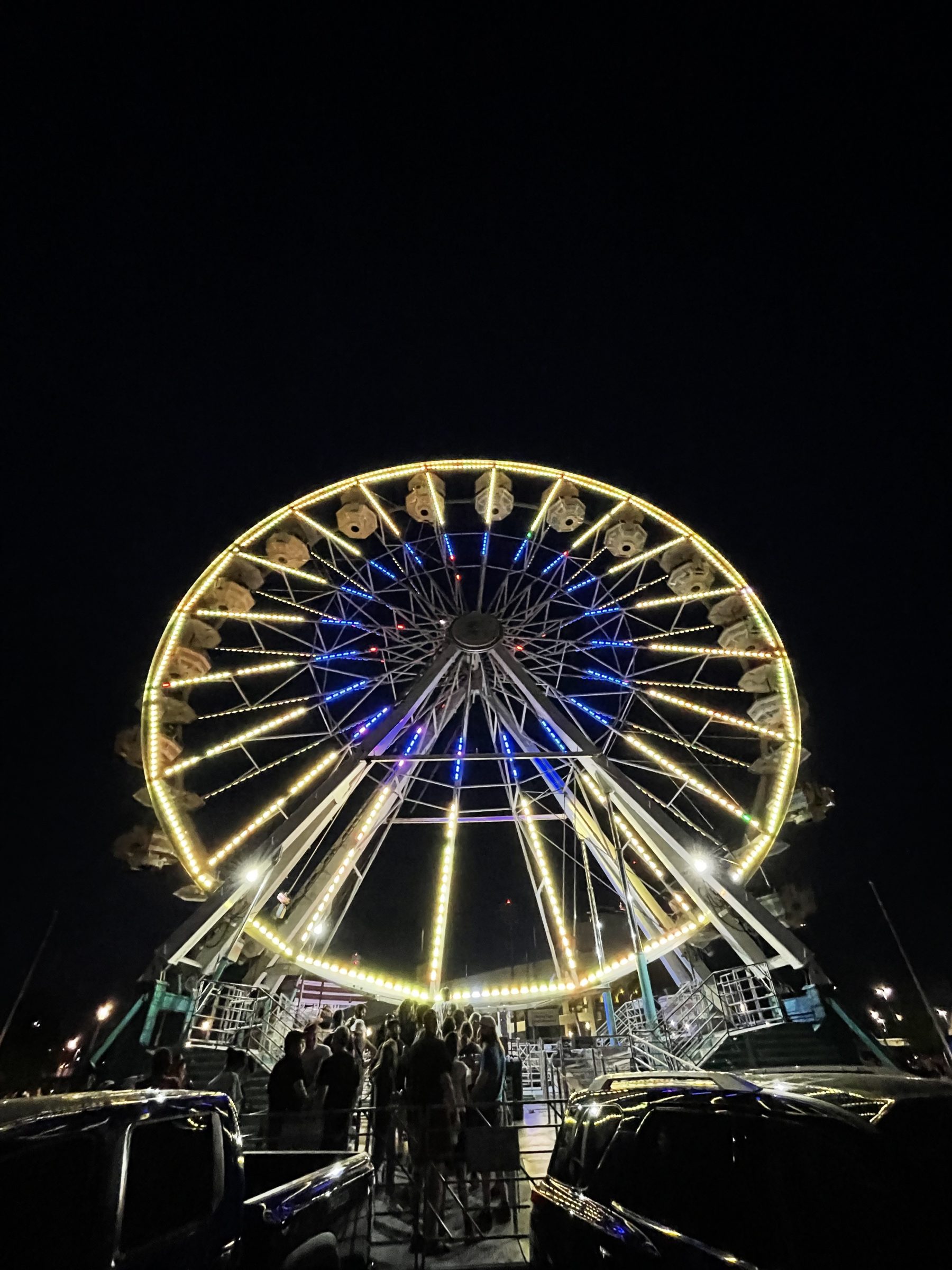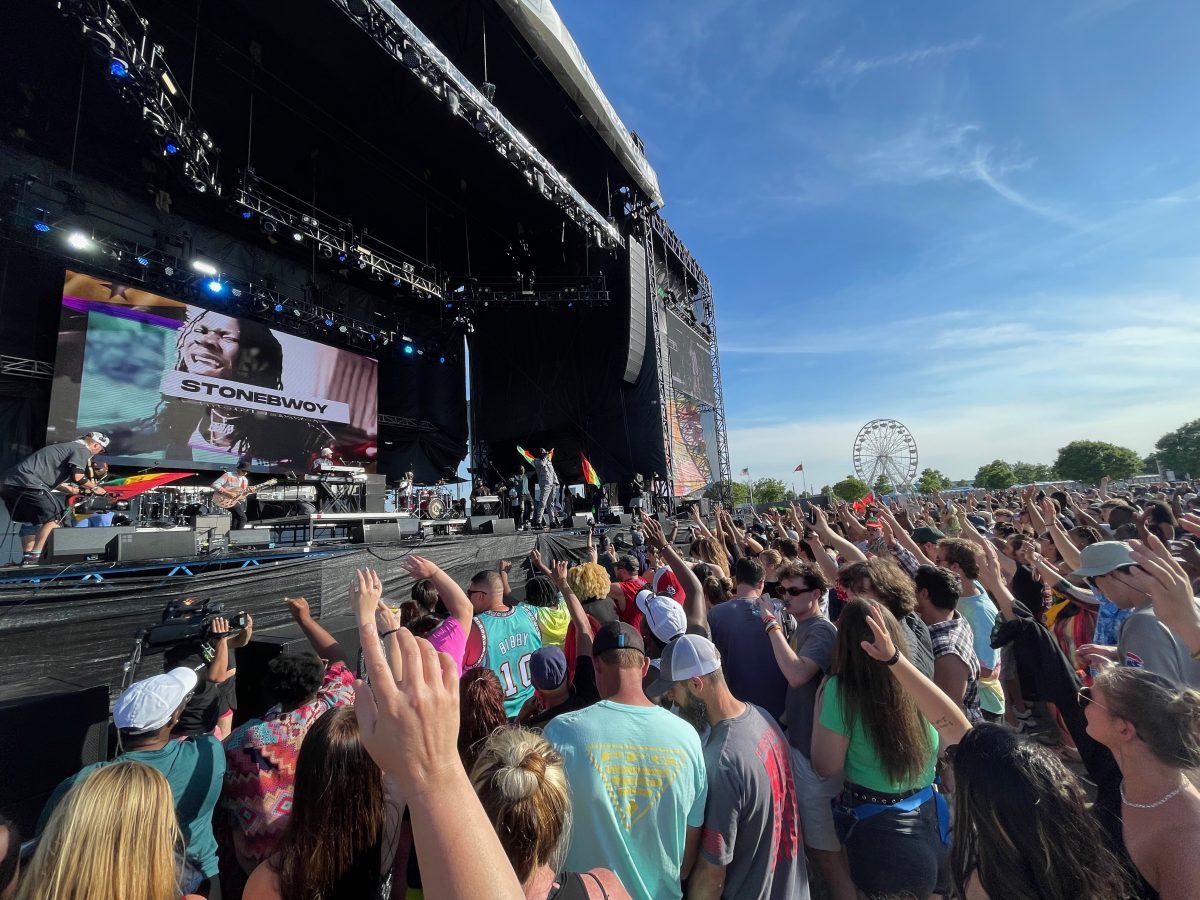When, with the flash of a press pass, I breezed through the Will Call checkpoint outside Memphis in May’s Beale Street Music Festival at Liberty Park on Sunday, I heard people checking the score of the Grizzlies’ first matchup against the Warriors. The Griz were down, but it was early in the game, and I couldn’t help but take it as a good omen. This year’s BSMF might be in a different location, but some things never change.
First on my list was genre-bending songsmith Cory Branan, backed by an ace crew of Memphis musicians including drummer Shawn Zorn, bassist Landon Moore, and Flyer music editor Alex Greene on keys. Is it a conflict of interest to say that Branan and band blew me away with their tight 25-minute set? Oh well, journalistic malpractice be damned! Though the band’s set was necessarily truncated by circumstances outside their control, thanks to the kind of behind-the-scenes logistical difficulties endemic to festivals as big as BSMF. One rule to keep in mind for any event with more than three bands on the bill: Embrace the chaos. We concert-goers were miles from the Mississippi River for this year’s MIM, but that wouldn’t stop me from going with the flow.
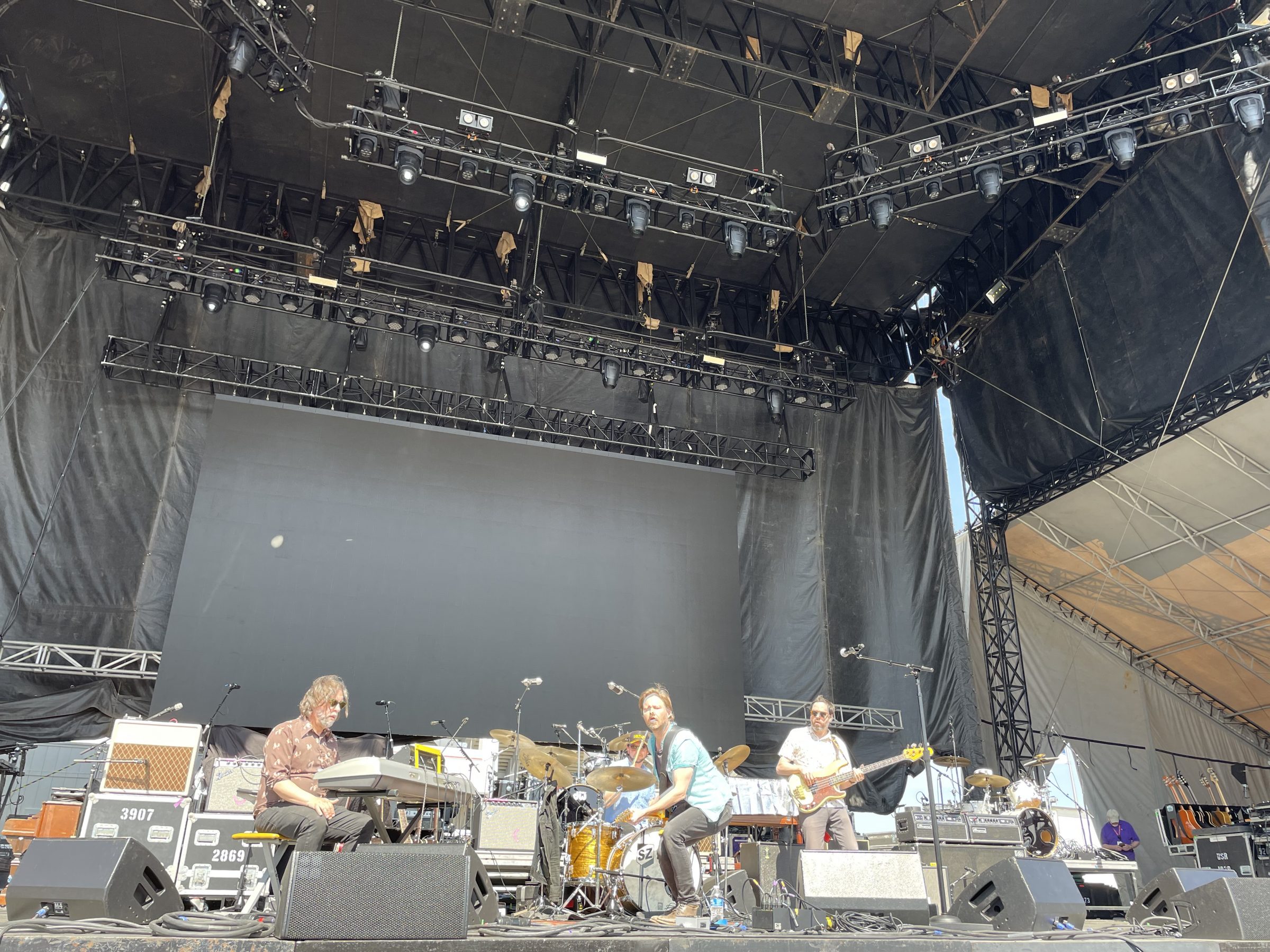
Branan and band were locked in, ripping through a set of originals with precision and energy. The bass, drums, and keys, all high in the mix, evoked shades of Memphis music of yore, both soul and rock-and-roll, while Branan plucked notes from his Telecaster. The songwriter walks a weaving line between rock-and-roll, punk, and country, and his sound fit the tone of the Memphis festival. After a blistering rendition of “Prettiest Waitress in Memphis,” Branan quipped, “We appreciate your low standards.”
Jokes aside, as Flyer film editor Chris McCoy put it in his recap of Saturday’s festivities, “Judging from the reactions our folks have been eliciting from the throngs gathered in the shadow of the Coliseum, increasing the locals’ main stage time is the best decision Memphis in May has made in a long time.” Branan and band were proof positive.
Next up, I made my way to the Terminix Stage to catch a few songs from Indigo Girls. I made it to the stage in time to catch “Least Complicated.” Indigo Girls made use of two acoustic guitars, a violin, and vocal harmonies. It was soft and sweet, like a breeze on a sunny May afternoon.
Leaving the stage I met Flyer reporter Michael Donahue, who was working the crowd and getting photos and quotes for his “We Saw You” column. Not 60 seconds after Donahue and I met, someone approached the wild-haired writer to ask him if he was Brian May, best known as the guitarist for Queen. I laughed, and Donahue and I made our way to the Blues Tent.
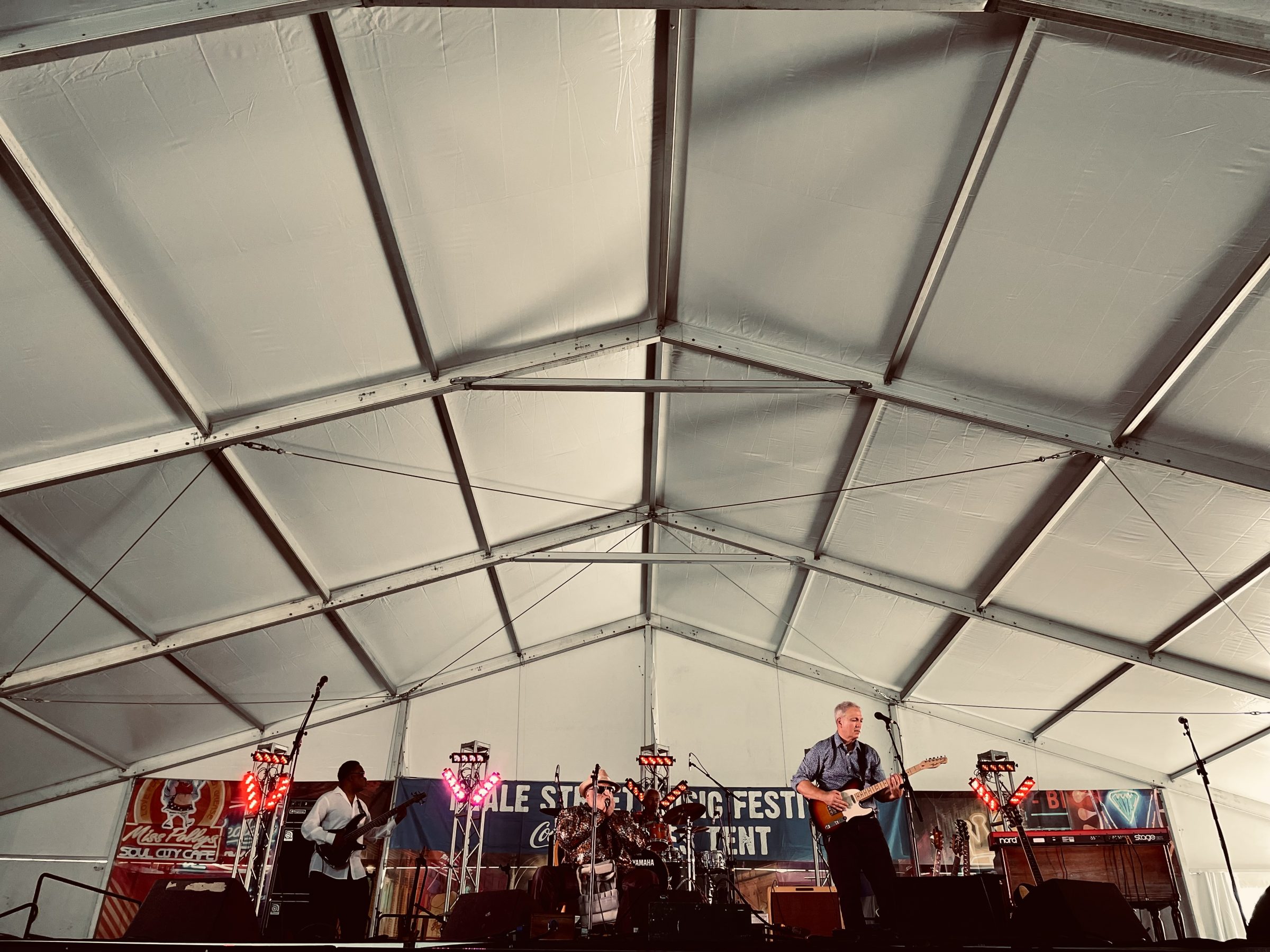
The crowd at the Coca-Cola Blues Tent spilled out onto the pavement outside the tent. (Note: Asphalt is hot, much hotter than the turf at Tom Lee Park. Of course, asphalt doesn’t get muddy either, so any attempt at a comparison is more or less pointless. Again, I was reminded of the festival-goer’s refrain: Embrace the chaos.)
Without delay, a fan accosted Donahue for a selfie. I left the busiest man in party reporting to his work and wove my way through the crowd and into the shade under the tent. Inside, Blind Mississippi Morris was wailing on a harmonica, backed up by a tight trio of guitar, bass, and drums. The bass rumbled, the guitar jangled, and the harmonica growled and howled. It was a fine display of Delta blues, and I was again glad that the BSMF lineup was packed with local and regional acts.
After a bass solo and a veritable cannonade of drum fills, Blind Mississippi Morris’ set drew applause and cheers from an appreciative audience. “It’s time for us to go,” Morris said. “Thank you for coming out for us.”
By that point, I had settled on a loose plan to follow the natural path of the stages — they were arranged like the vertices of a giant “M” — so my next stop was the Bud Light Stage to see Ghanaian band Stonebwoy. I glanced at my phone to make sure I was more or less on time, and saw a text from the Flyer’s film editor: “I decided to come to the festival. Where you at?”
So, having just parted ways with Donahue, I met Chris McCoy and waited for Stonebwoy to finish their sound check. I heard someone in the crowd call out the score of the Grizzlies game. “Grizzlies are down 99 to 90,” he said. “It’s a game! It’s a game!” A few minutes later, the score sat at 99 to 93, with the Warriors leading.
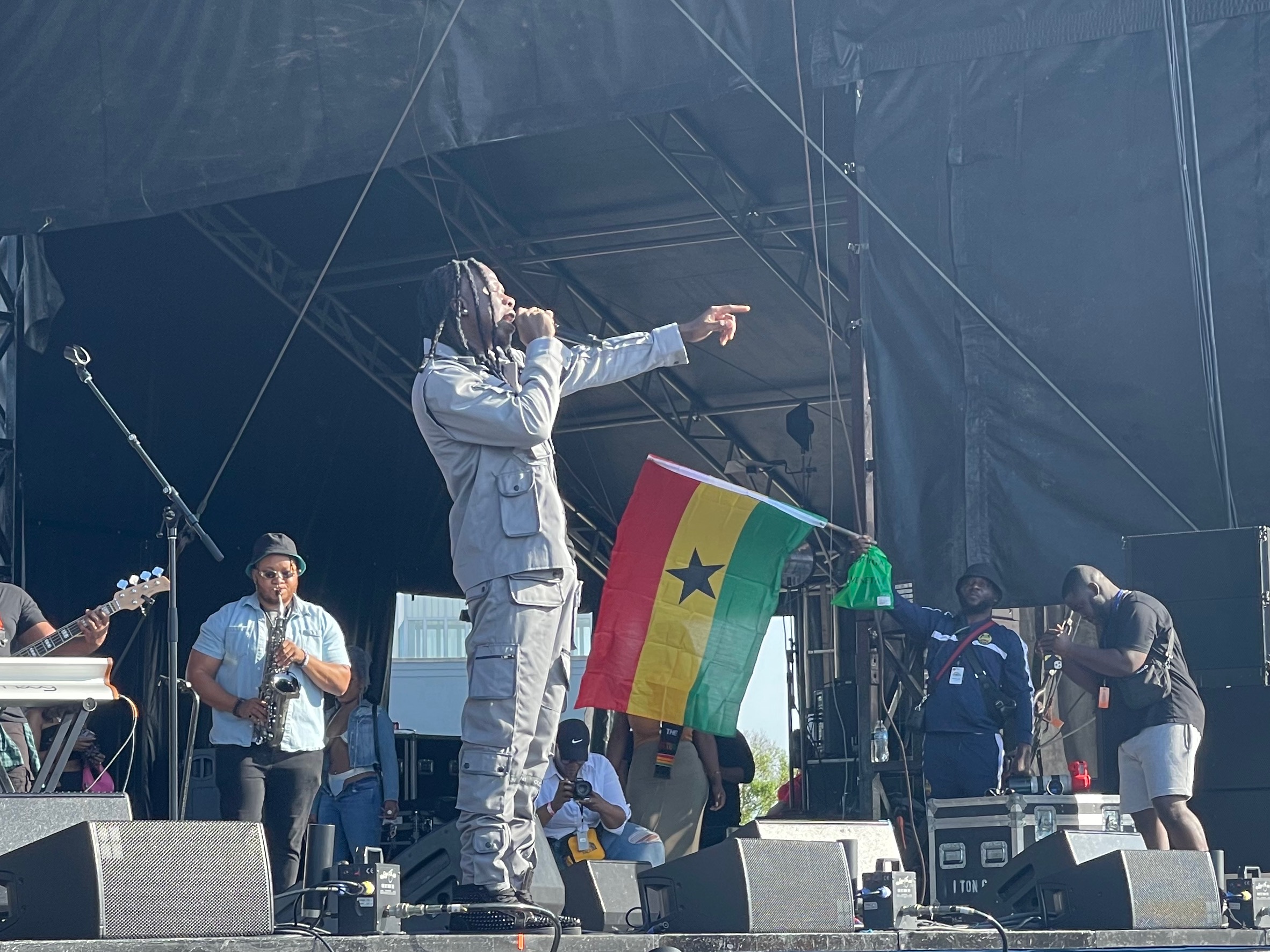
A gentle breeze wafted across the audience, seeming to carry clean guitar notes and the sounds of saxophone. The bass and drums invited the audience to dance. Stonebwoy’s band wove Afropop and reggae grooves while the singer led the crowd in a call and response. “Say ‘Stonebwoy,’” he called. “Say ‘Memphis.’”
Next, McCoy and I made our way to the Zyn stage for the last half of Grace Potter’s set. When we arrived, the concert was in full swing, with the audience sprawling across the parking lot. With a Flying V guitar slung over her shoulder, Potter led her band in a riff on “Proud Mary.” Whether she was turning up for Memphis, or because her band is just that good, Potter and company suffused their set with samples of rock-and-roll, country, soul, and gospel. She’s a rock artist, but her sound is rife with elements of all the musical milieu that forms the bones of American music.
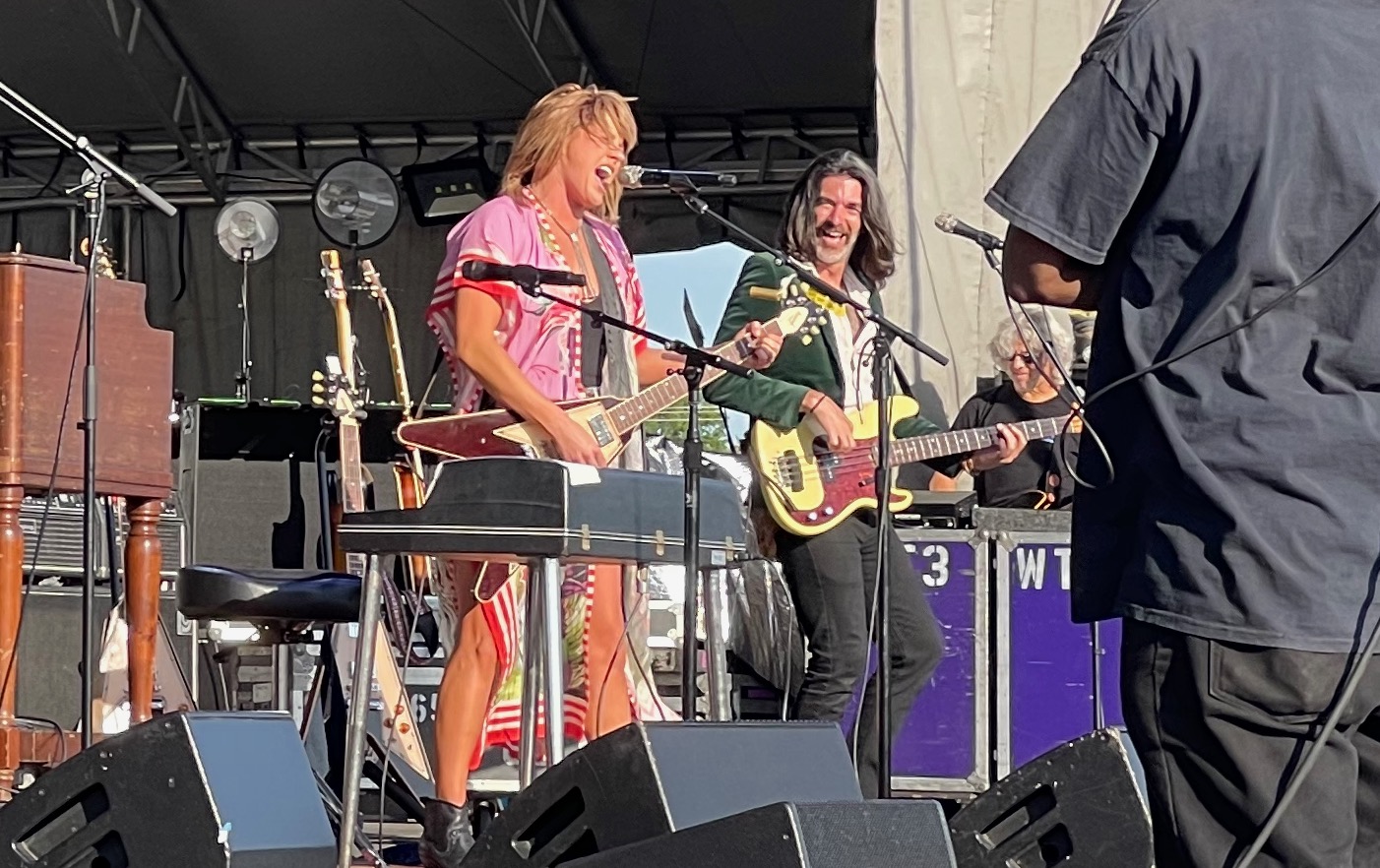
“That was a dirty little carousing we just had,” the singer said. So, with the Liberty Bowl behind her and facing the Coliseum, Potter switched from guitar to what looked like a Fender Rhodes piano to tambourine, leading her band through high-energy song after song.
Potter sang a bit of Tom T. Hall’s “That’s How I Got to Memphis” before praising the Bluff City. “This place is so full of culture,” she said. Later in her set, someone from the audience called out for “Apologies,” one of the singer’s quieter numbers. “I’m a rock-and-roll musician!” Potter responded. “Don’t you want to hear some rock?”
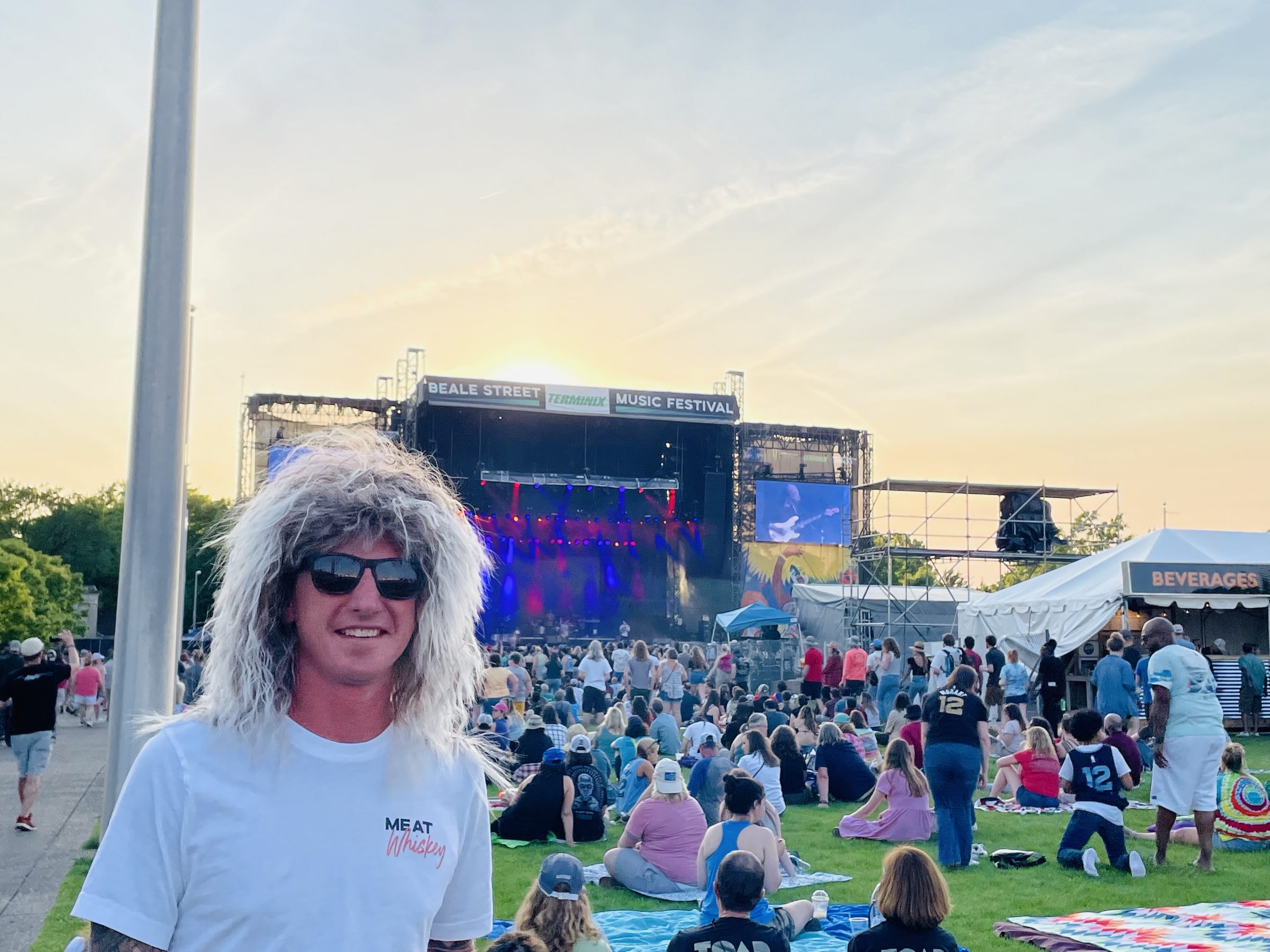
On the way back to the Terminix Stage, I saw someone in a flowing wig who appeared to be cosplaying as Michael Donahue. When I asked him if that was true, Memphian Bryan Cox confirmed that and said, “People keep asking me that.”
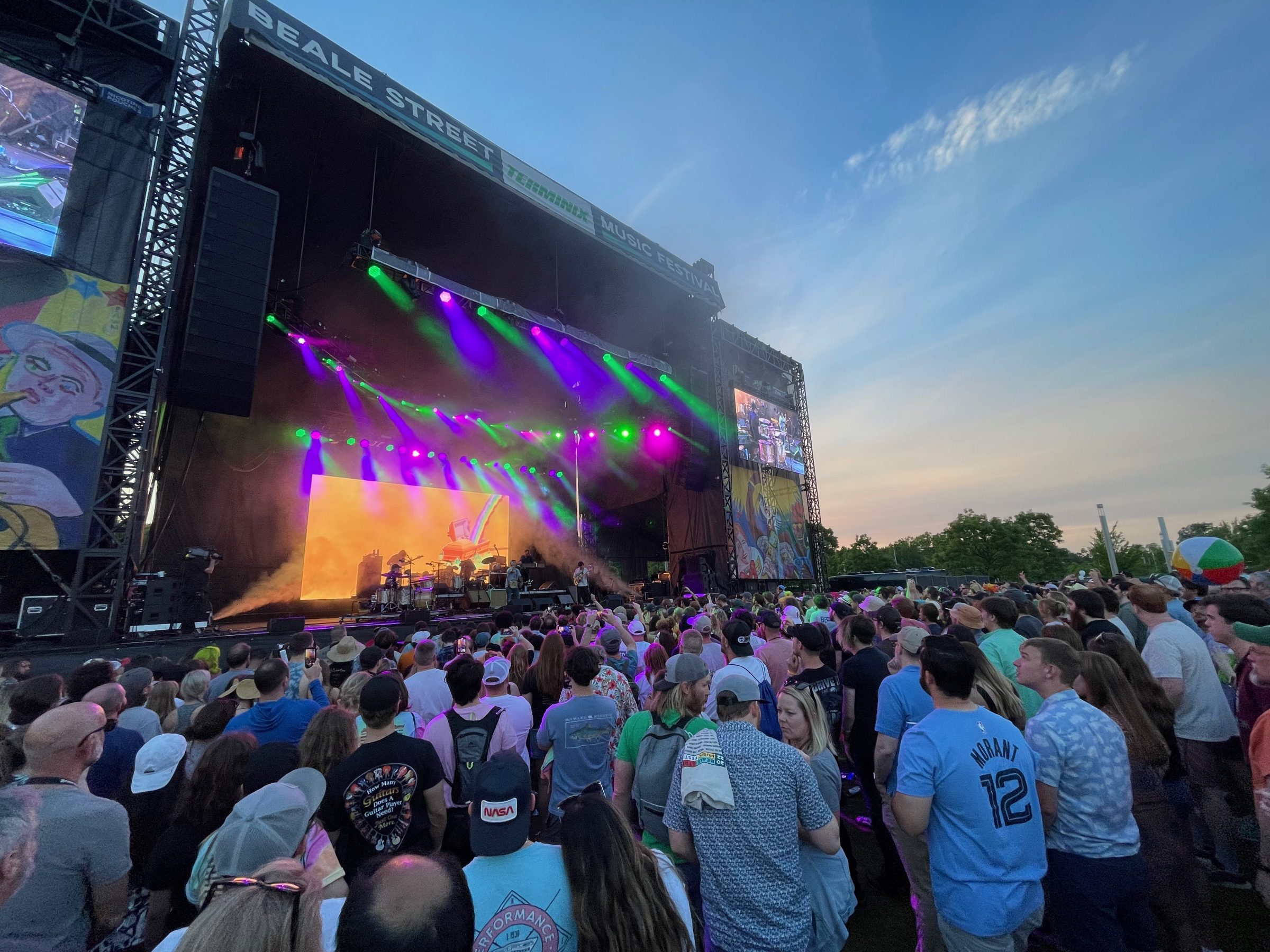
Then Modest Mouse took to the Terminix stage, opening with “Dramamine” from 1996’s This is a Long Drive for Someone with Nothing to Think About. The screen behind the band showed a shimmering rainbow seeming to cascade into an open cartoon casket.
The band worked their way through several songs spanning multiple albums. They played newer tracks, as well as hits like “Ocean Breathes Salty,” “3rd Planet,” and “Float On.” It was a solid set of layered songs from a band of indie rockers who have been at it for years.
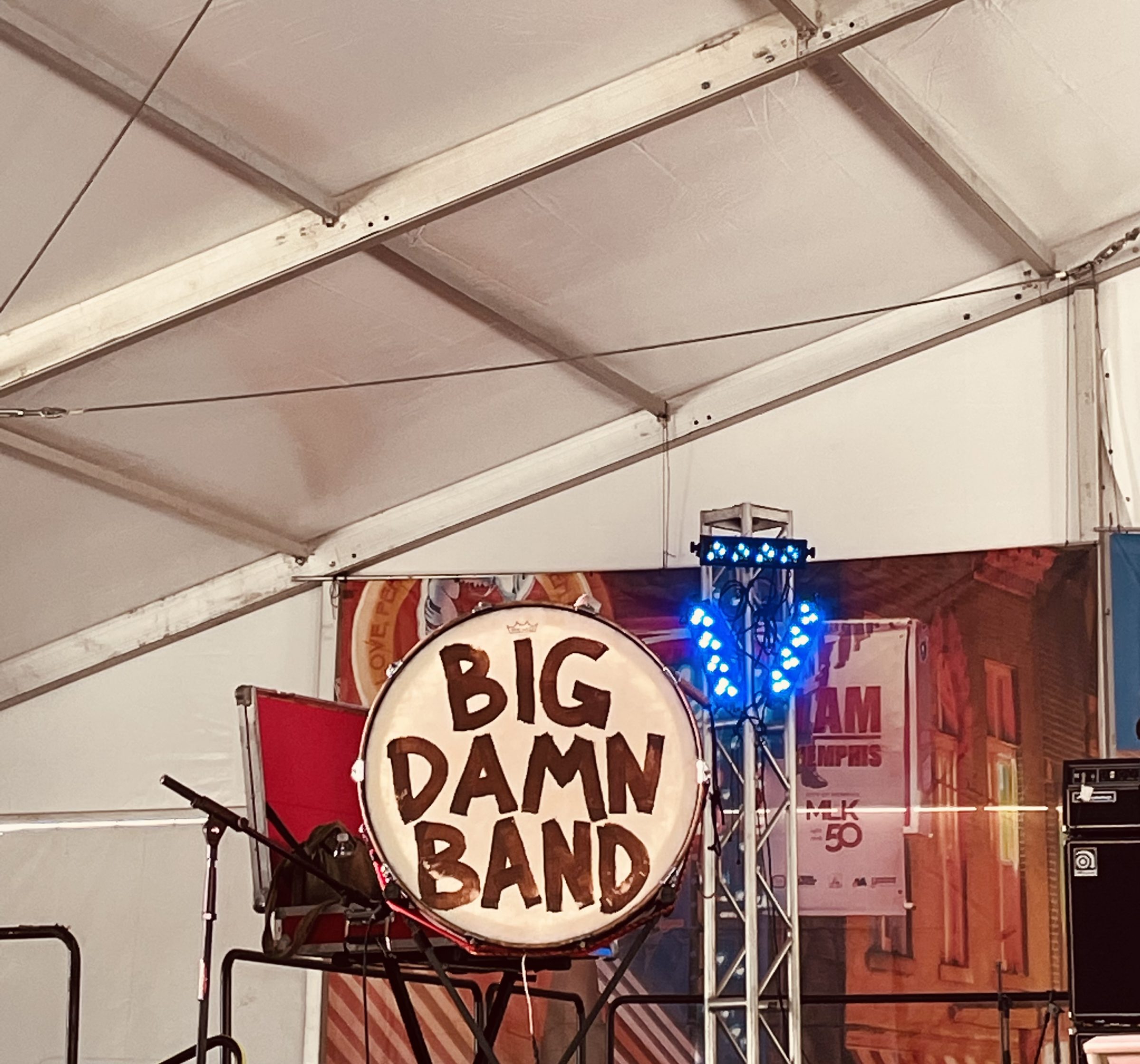
At some point in the day, I caught some more groups in the Blues Tent, but nine hours of nonstop music has a way of making a jumble of my interior clock. I think I stopped by the Blues Tent on the way back to the Bud Light stage to catch Memphis rapper Moneybagg Yo.
As the sun set, bringing blessedly cooler temperatures, music fans packed the area in front of — and anywhere near — the stage. Moneybagg Yo pulled in a huge crowd, and the energy was high as people danced, drank, and waved their phones in the air.
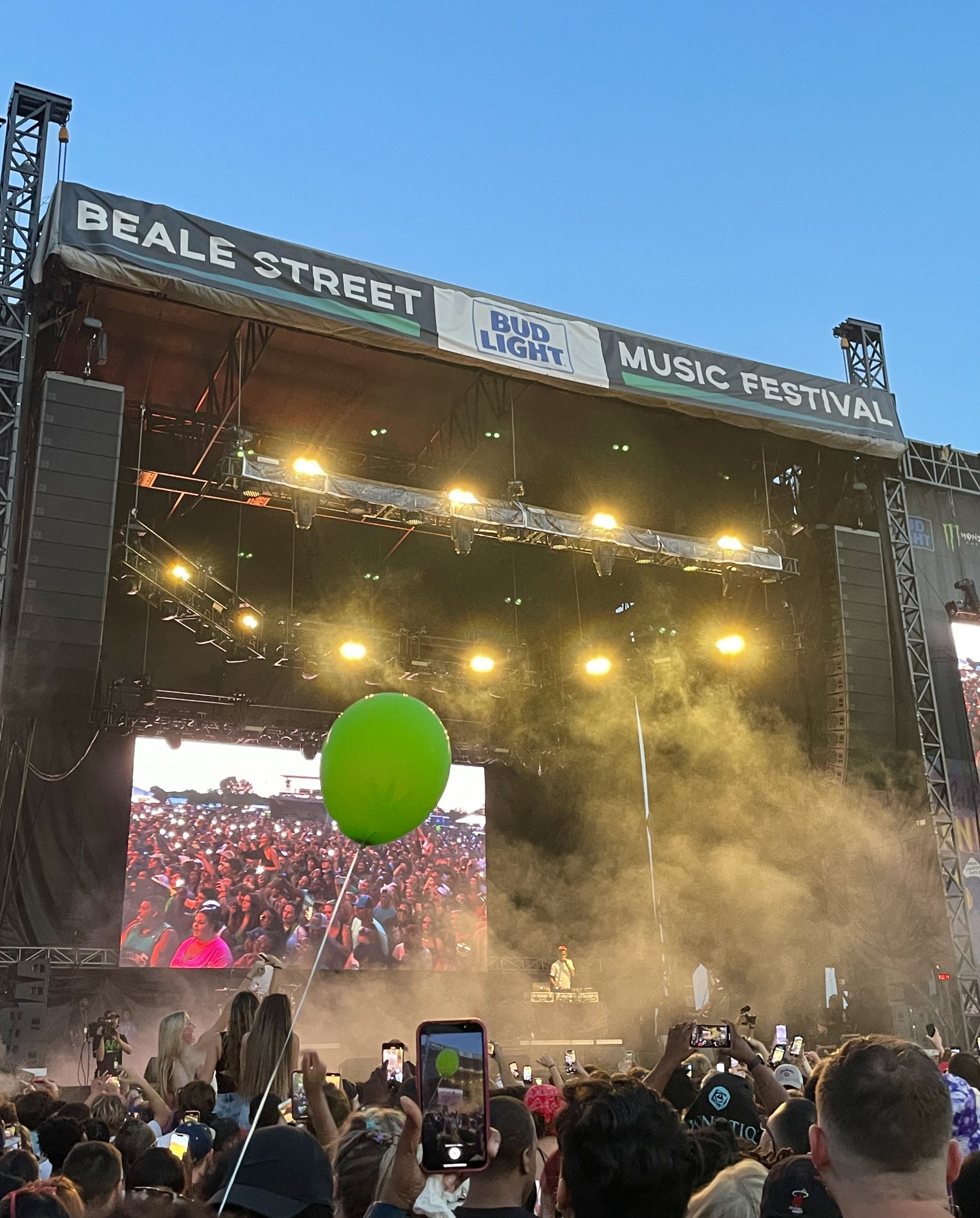
“If you from Memphis, what side of town you from?” Moneybagg Yo called out, proving he has his finger on the pulse of his city. The bass on “Pistol by Da Bed” had heads nodding along as jets of smoke shot into the air in front of a giant stylishly glitched-out screen behind the performers.
“Every lighter up,” he said later in the set. “This shit’s special. You know why? ’Cause I’m from Memphis. We dream big.”
And it was special, as his set turned into the de facto headlining concert to close out that stage, as news made its way around that Lil Wayne had been forced to cancel, allegedly because of mechanical problems with his jet. No matter, Moneybagg Yo made the most of it, name-checking Memphis neighborhoods to a crowd of dancing, cheering fans.
To close out the night, Weezer took to the Terminix Stage. They ripped into “Hash Pipe” from 2001’s green-hued self-titled album. (The band has something of a penchant for releasing color-coded self-titled albums. At this point, it’s kind of a thing.) Bandleader Rivers Cuomo sang in a falsetto over crunchy guitar riffs and a gut-rattling bass line.
The band played a set that spanned their 15-abum discography, delivering hooks and crowd-pleasers aplenty. They offered up “Beverly Hills,” “My Name Is Jonas,” “El Scorcho,” and “Undone (The Sweater Song).” After a cover of “Enter Sandman,” Cuomo joked “Hey, Memphis! We’re Metallica.”
With the “exit night” refrain rattling around in my thoroughly rocked head, I made my way back to my car. After two years of a pandemic-induced pause, BSMF was back and, chaos aside, a definite success. As I drove home, I heard celebratory fireworks explode in the air above the city.
